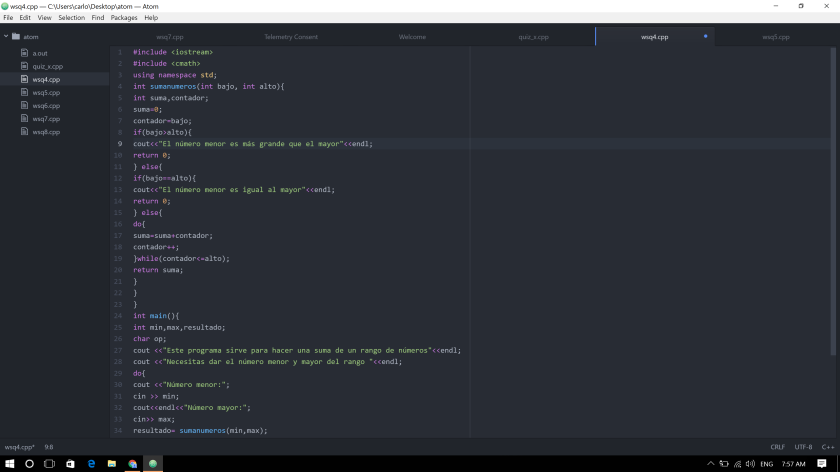this message it is for my class teacher Ken, I wanted to say one big thanks I understand I am not the best student nor the worst, I think you would forget me but, this class show to me my problems in life, why I can not be the person I want to become if I continue this path, for this I wanted to say sorry I tried and I fail me, but, this lesson I know it is difficult but I want to make a promise to move on, to really make something, become I want to talk and feel that I accomplished my goals for that I want to be helped and I will search for that.
if someone see this
please, If you enter here to study or look to my blog (not a quality one I must say) You should understand something I wanted to say, study, put attention to this class if you want to succeed this class is not the one you will need to study by yourselves and this class is the exam for and adult life you should look for it because in the end no one would look for you in the work, I need to learn and this is and example I want to go back and see in my life for the expression of see why I do wrong during this year.
TC1017
Why this class was important to me this class show me one aspect really important for my life as a student in this moment how I am as a self studding person, I understand my lack of responsibility and think why I am like this it is important to learn from my problems and give the importance to the thinks that are important.
wsq12
wsq11
wsq10
#include <iostream>
#include <cmath>
using namespace std;
float square_root(float x)
{
float resp;
resp=x/2;
do
{
cout<<resp<<endl;
resp=(resp+x/resp)/2;
}while( abs(a-resp) > 0.0001);
return resp;
}
int main()
{
cout<<square_root(16.23654);
}
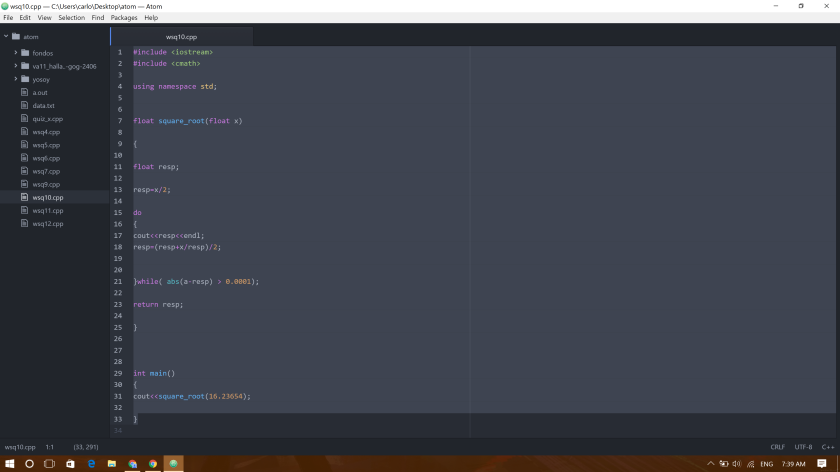
wsq9
wsq7
this one was really important, but I would say it I don’t understand well arrays and how they are manage for that reason I do this wsq with other methods that are valid but it would be better for it to have done it with the way you say it Ken sorry.
#include <iostream>
#include <cmath>
using namespace std;
float sum (float a, float b, float c, float d, float e, float f, float g, float h, float i, float j){
float Rsum;
Rsum = (a + b + c + d + e + f + g + h + i + j);
return Rsum;
}
float prom (float a, float b, float c, float d, float e, float f, float g, float h, float i, float j){
float Rprom;
Rprom = ((a + b + c + d + e + f + g + h + i + j)/10);
return Rprom;
}
float desviacionstd (float a, float b, float c, float d, float e, float f, float g, float h, float i, float j){
float varianza ,total, Desviacion;
total = (a + b + c + d + e + f + g + h + i + j)/10;
varianza = pow(a-total,2)+pow(b-total,2)+pow(c-total,2)+pow(d-total,2)+pow(e-total,2)+pow(f-total,2)+pow(g-total,2)+pow(h-total,2)+pow(i-total,2)+pow(j-total,2);
Desviacion = sqrt(varianza/10);
return Desviacion;
}
int main(){
float a,b,c,d,e,f,g,h,i,j,sumatoria,promedio,desviacionstandart;
cout << «inserte 10 numeros» << endl;
cin >> a;
cin >> b;
cin >> c;
cin >> d;
cin >> e;
cin >> f;
cin >> g;
cin >> h;
cin >> i;
cin >> j;
sumatoria = sum(a,b,c,d,e,f,g,h,i,j);
promedio = prom(a,b,c,d,e,f,g,h,i,j);
desviacionstandart = desviacionstd(a,b,c,d,e,f,g,h,i,j);
cout << «la sumatoria es » << sumatoria << endl;
cout << «el promedio es «<< promedio << endl;
cout << «la desviacion es «<< desviacionstandart << endl;
return 0;
}
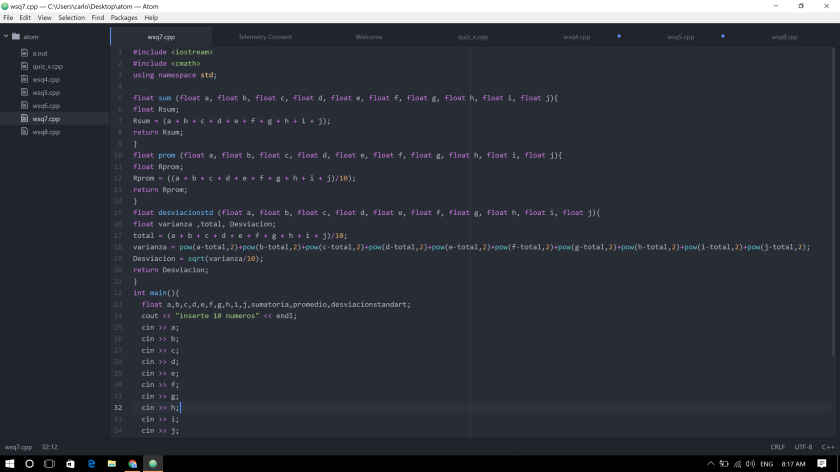
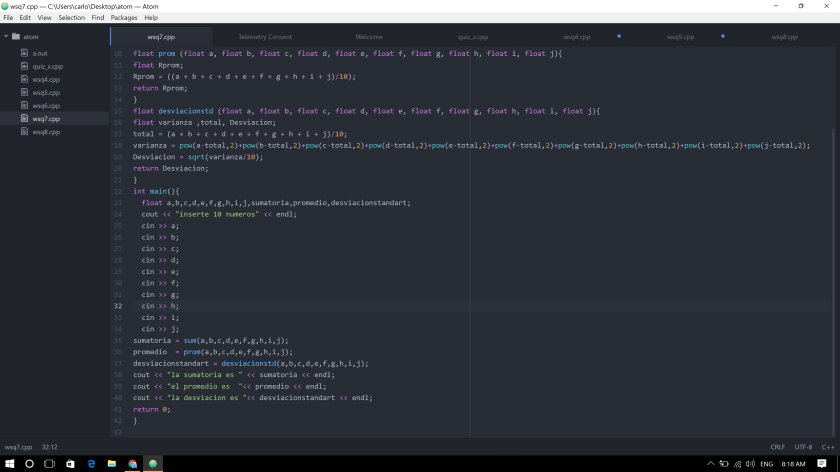
wsq5
For this homework I was studding in the book and looking my Lynda.com videos those videos are really interesting and helpful for learning programming.
#include <iostream>
#include <cmath>
using namespace std;
int sum(int n1, int n2)
{
return(n1+n2);
}
int dif(int n1,int n2)
{
return(n1-n2);
}
int pro(int n1, int n2)
{
return(n1*n2);
}
int divi(int n1, int n2)
{
return(n1/n2);
}
int mod(int n1, int n2)
{
return(n1%n2);
}
int main()
{
int n1,n2;
cout<<endl;
cout<<‘This program gives you the sum, difference, multiplication, division and the remainder of two given numbers.'<<endl;
cout<<endl;
cout<<«Please insert the first number:»<<endl;
cin>>n1;
cout<<«Please insert the second number:»<<endl;
cin>>n2;
int s=sum(n1,n2);
int d=dif(n1,n2);
int p=pro(n1,n2);
int di=divi(n1,n2);
int m=mod(n1,n2);
cout<<«The result of the sum is» <<s<<“.”<<endl;
cout<<«The result of the difference is «<<d<<“.”<<endl;
cout<<«The result of the product is»<<p<<“.”<<endl;
cout<<«The result of the division is»<<di<<“.”<<endl;
cout<<«The remainder of the division is»<<m<<“.”<<endl;
return 0;
}
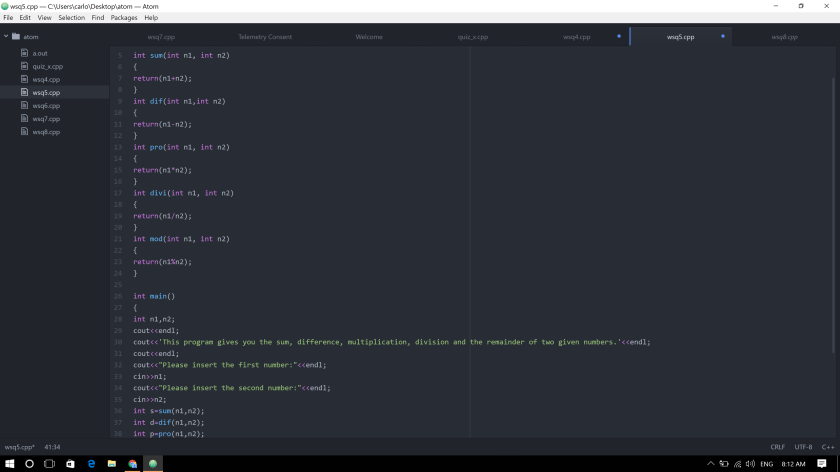
wsq4
this homework was difficult in the begging of it, but when I was reading the book I understand what the problem was asking exactly and I starting to code and I could finish it.
#include <iostream>
#include <cmath>
using namespace std;
int sumanumeros(int bajo, int alto){
int suma,contador;
suma=0;
contador=bajo;
if(bajo>alto){
cout<<«El número menor es más grande que el mayor»<<endl;
return 0;
} else{
if(bajo==alto){
cout<<«El número menor es igual al mayor»<<endl;
return 0
} else{
do{
suma=suma+contador;
contador++;
}while(contador<=alto);
return suma;
}
}
}
int main(){
int min,max,resultado;
char op;
cout <<«Este programa sirve para hacer una suma de un rango de números»<<endl;
cout <<«Necesitas dar el número menor y mayor del rango «<<endl;
do{
cout <<«Número menor:»;
cin >> min;
cout<<endl<<«Número mayor:»;
cin>> max;
resultado= sumanumeros(min,max);
if(resultado>0);{
cout<<«Resultado:»<<resultado<<endl;
}
cout<<«¿Quiere hacer otra suma?(s/n)»<<endl;
cin>>op;
}while(op==’S’||op==’s’);
return 0;
}
